Connect with Leasing News ![]()
![]()
![]()
![]()
![]() Add me to mailing list |
Add me to mailing list | ![]() |
| ![]() Search |
Search | ![]() Stress Release
Stress Release
Advertising | All Lists | Archives | Classified Ads | This Day In American History
Leasing News is a web site that posts information, news, and
entertainment for the commercial bank, finance and leasing industry
kitmenkin@leasingnews.org
![]()
Wednesday, October 24, 2012

Go Giants!
Today's Equipment Leasing Headlines
--Exclusive--
Clean Energy Lease Gets $32 Million Dirty
By Tom McCurnin
Classified Ads---Senior Management
Classified Ads--Help Wanted
Shawn Halladay on the ELFA Convention in So. Calif.
ELFA Elects 2013 Board of Directors and Officers
Leasing News Remains WWW Webnews #1
Ten Nations that Control the World's Gold
24/7WallSt.com
TARP redemptions: It's payback time
By Tahir Ali and Fahad Mir, SNL Financial
Why I Became a CLP
James "Jim" E. Coston, Esq.
Beagle Mix--Puppy
Chicago, Illinois Adopt-a-Dog
Equipment Leasing & Finance Foundation Forecasts
Equip. Finance Sector to Surpass $740 Billion in 2013
Final Defendant Sentenced
in Blue Ocean Mortgage Fraud Scheme
Open Positions at Leasing Funders
News Briefs---
Wells Fargo approves a record $1.24 billion
in SBA loans for America's small businesses
CIT Group Posts Wider Loss
Caterpillar 3Q Earnings Analysis: Sober
White Clarke Country Surveys Asset & Auto Finance
Bank of West/BPB Paribus Leasing enhanced
equipment finance/leasing program
Yankee Stadium Parking Company Defaults on its Bonds
Apple Unveils iPad Mini
Broker/Funder/Industry Lists |
Features (collection)
Top Ten Stories Chosen by Readers |
Top Stories last six months
You May have Missed---
SparkPeople--Live Healthier and Longer
Sports Briefs---
Baseball Poem
California Nuts Brief---
"Gimme that Wine"
This Day in American History
SuDoku
Daily Puzzle
GasBuddy
Weather, USA or specific area
Traffic Live----
######## surrounding the article denotes it is a “press release”
and was not written by Leasing News nor information verified, but from the source noted. When an article is signed by the writer, it is considered a “by line.” It reflects the opinion and research of the writer.

Please send Leasing News to a colleague and ask them to subscribe.
We are free!
[headlines]
--------------------------------------------------------------
--Exclusive--
Clean Energy Lease Gets $32 Million Dirty
By Tom McCurnin
Barton, Klugman & Oetting

Three Solar Energy Cases Expose Challenges of Leasing Solar Equipment to Government Entities
No Matter What the Enhancement Might Be
Having just come off a failed solar power project in the Salton Sea in Southern California, I read with great interest a trilogy of cases involving a lease close to $32.2 million, not counting court and attorney fees, of solar equipment involving 16 county fair groups in California. There are other such leases with in the United States. Here are the ones in California:
FAIR AND LOCATION |
INITIAL PROJECT COST |
SELF-GENERATION INCENTIVE PAYMENT |
NET PROJECT COST |
| Kern County, Bakersfield | $ 1,653,160 |
$ 854,412 |
$ 798,748 |
| Eastern Sierra Tri-County | 172,718 |
97,202 |
75,516 |
| The Big Fresno, Fresno | 4,342,629 |
2,456,262 |
1,886,367 |
| Amador County, Plymouth | 311,527 |
150,789 |
160,738 |
| Shasta District, Anderson | 819,804 |
423,039 |
396,765 |
| Tehama District, Red Bluff | 542,829 |
307,032 |
235,797 |
| Santa Maria, Santa Maria | 1,085,657 |
614,064 |
471,593 |
| Lake County, Lakeport | 390,092 |
236,724 |
153,368 |
| Antelope Valley, Lancaster | 3,171,527 |
1,838,684 |
1,332,843 |
| Marin County, San Rafael | 929,692 |
614.064 |
315,628 |
| El Dorado County, Placerville | 788,060 |
446,592 |
341,468 |
| Sonoma County, Santa Rosa | 3,595 522 |
2,209,027 |
1,386,495 |
| Chowchilla-Madera County, Chowchilla | 499,738 |
179,140 |
320,598 |
| Lodi Grape Festival & Harvest, Lodi | 195,181 |
97,164 |
98,017 |
| Napa County, Calistoga | 346,135 |
194,328 |
151,807 |
| National Orange Show | 2,155,728 |
1,228,131 |
927,597 |
(PNC 2 Fair and Locations (1))
This article is about three of the cases above to demonstrate why equipment financing of solar energy is so challenging. The first challenge is the cost—the cost of the equipment is astonishingly high. The second challenge is finding a creditworthy lessee. Finally, what makes the lease work are Clean Renewable Energy Bonds (“CREBs”) which provide qualified issuers and qualified borrowers with the ability to borrow at a 0% interest rate. If those elusive carrots aren’t present in the deal, the whole transaction collapses.
The Solar Program
A consortium of local California fair associations formed the California Fairs Financing Authority, a California nonprofit Joint Powers Authority (“CFFA”) to acquire and finance solar projects for approximately 16 different local County fairs. Solar power panels were purchased from the vendor and were leased by National City Commercial Capital (now PNC--- National City Commercial Capital Corporation, who originally wrote the leases, had.
The equipment was described on the lease contracts as “install 2,988 KX158G photovoltaic modules (page 51), install 6,336 Kyocera KC158G modules (page 52), Install 630 Kaneka GSA211 photovoltaic modules, 1188 install 270 Kyocera KSI-167G photovoltaic modules (page 54) and each location was different. (2)
In California, it was contemplated that California Fairs Financing Authority would issue Clean Renewable Energy Bonds, pending its application to the IRS. Although the imputed premium rate of 7% was certainly high for government financing, it was anticipated that fair group would refinance the leases with a 0% loan, as allowed by energy bond rules. The county fair associations would save around 5% in energy costs, and thus pocket the difference. They were also supporting “green energy.” This all sounds too good to be true, doesn’t it? They should have remembered the old saying, “If it sounds too good to be true, it isn’t.”
Oh, yes, the leases had fairly convoluted and not merely a Fair Market Value --- as well as continuing rental payments (if the equipment was not returned at the expense of the lessee.) (3)
The Leases
The leases were all to California Fair Finance Authority, which acquired title to the solar panels and disbursed them throughout California to 16 different local county fair associations. The local fair associations, in turn, agreed to pay user fees to CFFA, and PNC took a security interest in that payment stream. The leases envisioned that they would be refinanced once CFFA was qualified to issue Clean Renewable Energy Bonds and this term was incorporated into the purchase option.
In essence, the parties contemplated two options: (1) either PNC would purchase the CREBs, or (2) they would be purchased by a third party. In either scenario the deal is refinanced. The parties never contemplated that they would evaporate.
For several years, everything went fine. The country users enjoyed the electrical savings, made the payments to CFFA, and CFFA, in turn, forwarded the user fees to PNC.
What Went Wrong
In a perfect storm of problems, this deal collapsed in 2010.
Before the signing with the El Dorado County Fair Association, documents brought forth in the case the written statement that William Garnett and Cliff Svovoda, employees of PNC, pitched the fact that PNC was getting a generous interim rate of return pending the refinance through the CREBs which would be issued by CFFA or even PNC. The statement was, “"[W]e will get the info you require--but, really our deal was we were going to take CREBs and, if we didn't, we would help them move the deal to someone who would." (4)
First, the California Finance Fairs Authority did not obtain Clean Renewable Energy Bonds refinancing, making this large dollar lease awfully expensive for 16 County fair associations. Although the energy savings was pegged at 5%, the lease was at 7% and could go on for over 10 years. Without the energy bonds and a refinance as was the original proposal, this deal made no sense for the 16 county fair associations.
Second, because of a budget crisis, many of the county fair associations simply did not have the money and defaulted. Unlike a true sovereign entity, these entities only have the money their local county dolls out plus a small stipend as the state also contributes via agriculture funds, so they are in a sense uncollectable. They put on an annual fair, only renting the real estate.
Finally, according to Becky Bailey-Findley, executive director of the California Fair Services Authority, when the California Fairs Finance Authority failed to obtain the Clean Renewable Energy Bonds, they laid off all of its employees and contracted out its management to the California Fair Services Authority, a separate agency. Thus, CFFA is out of business.
This leaves PNC to collect its very large obligation against 16 county fair organizations in California. While I cannot speak for every fair association sued, I know for a fact that many small county fair associations are staffed with only a handful of full time employees and they rent the space from the county, so their collectability is in doubt. For instance, it is no secret about the financial problems with the Santa Clara County Fair Association who went bankruptcy in 1995 and local newspapers report are in financial troubles again (5). Solano County is reportedly close to bankruptcy (6)
Forget about the clause of returning the equipment or repossessing the equipment that sits on a roof and is connected to a building leased by the county fair association, often they are owned by the county government. By the way, there were no landlord waivers or mortgage waivers in the court exhibits of the lease documents. Most likely many of the locations are on county owned real estate and would involve a “lease” approved by the county board of supervisors. The matter would have to become public information as I believe the county manager would have to inform the board of supervisors about the repossession action, as well as the county would have to approve putting the building into good order after the collateral was removal.
The reader will note that most the county fair associations have settled the lawsuits. If approval is required by a governmental agency, such as the County Board of Supervisors, terms of the settlement may be made public. The Sonoma County Fair Association received approval to pay $1.2 million on a contract balance of over $3 million. (7)
What is interesting to me is a court filing in which Eldorado County states that PNC and CFFA used National City Commercial Capital’s outside counsel, and that none of the Fair organizations ever had a lawyer look at the lease. I do understand that given the size and funding of these organizations, hiring outside counsel would be prohibitive. But to rely upon National City Commercial Capital’s outside counsel for legal advice? Really?
In today’s case, three of the 16 county fair association factors came into play, and a state association essentially went out of business, leaving the lessor high and dry, suing a group of local non-profit fair associations with uncertain collectability. The fair associations claimed that the lease was unfair and that they never read these multi-million dollar leases and relied upon the lessor’s attorney to give them legal advice.
Here is a brief status of three of the cases discussed in this article:
#1
• PNC Equipment Finance v California Fairs Financing Authority USDC ND, Cal. CV 11- 3768 (US DC, Northern District of California). Complaint, Answer and Counterclaim filed. PNC sought injunction compelling CFA to remit user fees to PNC. Tentative settlement reached amongst local fair associations and PNC in January, 2012. Dismissals entered as to some Counties.
#2
• PNC Equipment Finance v. California Fairs Authority USDC ED, Cal. CV 11- 02019 (US DC Eastern District of California). Complaint, Answer and Counterclaims filed. Eldorado County actively litigating matter. Central issue is that lease did not transfer title to local fairs. The CREBs and their legal effect seem to be main issue.
#3
• PNC Equipment Finance v. California Fairs Authority USDC CD, Cal 11-6248 (US DC Central District of California). Status: Complaint, Answers, and Counterclaims filed. Settlement reached, but undocumented. Case stayed pending outcome of litigation in Eastern District.
Lessons for the Lessor and Lessee
I have attached, in a link below, a copy of the Lease and Use Agreement for anyone who wants to examine solar financing up close and personal. But take my word for it, without Clean Renewable Energy Bonds, solar financing is a lot like making sausage—you really don’t want to see how it’s done. (8)
I’ve also attached an Opposition to a Motion to Dismiss filed by the El Dorado County Fair Association, in which the attorney does an excellent job telling the County’s side of the problem. (9) From their point of view, this was a bait and switch which went under the radar without counsel overseeing the transaction. PNC’s point of view is naturally quite different, that this is a true lease, and it deserves to be paid. I think legally PNC’s attorneys are correct, but from a collection standpoint, this deal stinks.
To summarize the lessons in these cases, I offer the following:
First, if the reader is a lessee or guarantor—Read the lease. Comedian Ron While, states in his stand up, “You can't fix stupid. There's not a pill you can take; there's not a class you can go to. Stupid is forever.” I find it amazing that a so-called sophisticated government organization would not read the user agreement
Second, if the reader is a lessor, this deal without Clean Renewable Energy Bonds and a collectable lessee makes no sense. Perhaps the lessor didn’t realize that fair associations are expendable. Perhaps the prospects of a 7% return colored their underwriting.
Finally, solar financing remains elusive. A simple Google search will find hundreds of companies which “allegedly” finance solar equipment, but at least in my recent experience in a Salton Sea solar development, I didn’t find their promises credible, unless until the lessee has actual skin in the game. Vendor financing is available, but the suppliers may want significant equity in the underlying operating company and assignment of the existing power supply contracts.
And need I mention the collateral also sucks. It would cost more to remove, store, and resell than the obsolete panels are worth.
The bottom line to these three cases is that solar energy financing remains elusively impractical except for lessees with skin in the game. No money down leases of solar equipment are doomed for failure without Clean Renewable Energy Bonds sponsored by the IRS.
As important, not all equipment should be leased, especially with the liabilities and recovery costs being so high--- a lesson the leasing industry continues to learn the hard way.
In retrospect, the best would have been a loan with a lien on the real estate involved---not a lease!
Tom McCurnin
Barton, Klugman & Oetting
350 South Grand Ave.
Suite 2200
Los Angeles, CA 90071
Direct Phone: (213) 617-6129
Cell (213) 268-8291
Fax: (213) 625-1832
Email: tmccurnin@bkolaw.com
Visit our web site at www.bkolaw.com
-
PNC 2 pages 48,49,68, 82, 83
http://www.leasingnews.org/PDF/PNC2.pdf
-
PNC 2 pages 51,52,54
http://www.leasingnews.org/PDF/PNC2.pdf
-
PNC Part (page 42 is lessee responsible for removal, packing, returns of equipment in default or not purchase).
http://www.leasingnews.org/PDF/PNCComplaintpart1.pdf
-
William Garnett/Cliff Svovada quote http://www.leasingnews.org/PDF/WilliamGarnettCliffSvovadapage10.pdf
-
Solano County Fair Financials
http://www.leasingnews.org/PDF/SolanoCountyFairFinancials.pdf
-
Sonoma County Fair received Approval to pay http://www.leasingnews.org/PDF/SonomaCounty
BoardofSupervisorsSettlement.pdf
-
PNC Sonoma County Lease and Use Agreement
http://www.leasingnews.org/PDF/PNCSonomaCo
LeaseandUseAgreement.pdf
-
Motion to Dismiss
http://www.leasingnews.org/PDF/OppositiontoMotiontoDismiss2012.pdf
Previous Tom McCurnin Articles:
http://www.leasingnews.org/Conscious-Top%20Stories/leasing_cases.html
[headlines]
--------------------------------------------------------------
Classified Ads---Senior Management
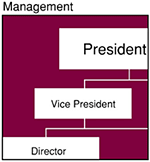
(These ads are “free” to those seeking employment or looking
to improve their position)
Philadelphia, PA
27 yrs. exp. sales, ops., credit, strategy, P&L mngmet.
Most recently created & executed the biz plans for 2 highly successful
Bank-owned small ticket leasing subsidiaries.
email: mccarthy2020@comcast.net
Free Posting for those seeking employment in Leasing:
http://www.leasingnews.org/Classified/Jwanted/Jwanted-post.htm
All “free” categories “job wanted” ads:
http://www.leasingnews.org/Classified/Jwanted/Jwanted.htm

[headlines]
--------------------------------------------------------------
Leasing Industry Help Wanted
 Experienced only, Sales Reps 1 Southeast, 1 West Coast www.ifsc.com |
For information on placing a help wanted ad, please click here:
http://www.leasingnews.org/Classified/Hwanted/Hwanted-post.htm
Please see our Job Wanted section for possible new employees.
[headlines]
--------------------------------------------------------------
Shawn Halladay on the ELFA Convention in Southern California
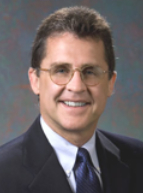
Shawn Halladay
The Alta Group
The Equipment Leasing and Finance Association (ELFA) 51st Annual Convention held at the JW Marriott Desert Springs Hotel, Palm Desert, California wound down tonight with the traditional end of convention party and a fine one it was (referring primarily to the convention, but the party was fun!). Several people commented that the finale seemed to come quickly. Whether in meeting rooms, in the bar, or on the golf course, everyone was busy, which was indicative of the mood at the convention. Business is good, and everyone was working to make it even better.
The number of attendees and exhibitors was another indicator of the positive attitude displayed by so many of those in attendance. Although at roughly the same level as last year, over 900 leasing and financial professionals, ELFA was very pleased, as West Coast locations typically are less well attended as those on the East Coast, so even holding even represents a positive result.
Yes, the mood was positive, even though there has been a stalling of the economy, according to some. A pervasive theme among the attendees as to the cause of this economic pause is the uncertainty surrounding the election. Many of those with whom I spoke believe that once this uncertainty is removed, things will start to move again, irrespective of the election results.
The impact of government and regulation not only was on the minds of the attendees, but, apparently, also ELFA, as keynote addresses were delivered by representatives of the FDIC and the FASB. Regulations such as Sarbanes and Frank-Dodd came up in many of the discussions around the breakfast tables and in the hallways, as many executives are finding more of their time being consumed by compliance tasks imposed by the various regulators. ELFA also addressed the tax environment by issuing a position statement on tax reform during the convention.
ELFA’s position in this regard includes treating owner-lessors and owner-operators in a tax neutral manner, maintaining cost recovery and interest deductions, including continuing provisions such as 100% expensing and maintaining section 179 expensing levels. Other positions included the need to maintain tax-exempt treatment of state and local government obligations and promote a more competitive international tax system.
The positive mood of the attendees was reflected in new study data from the Equipment Leasing and Finance Foundation that indicated that equipment finance volume has returned to pre-recession levels. Not unexpected was the revelation that the equipment finance sector is a significant contributor to capital formation in the US economy. Other findings included the levels of companies that use financing, the various forms of that financing, and company plans as to investing in new equipment.
There are challenges amidst this favorable news, though, as attendees reported a continuing focus by customers on rates. This rate dominance will continue to contribute to commoditization of the leasing product. On the flip side, several people saw this trend as an opportunity for enterprising lessors to focus on fair market value leasing as a way to differentiate themselves.
There were several comments on the quality of the presentations this year. Although there were those that spent time outside the meeting rooms, the convention educational sessions also were well-attended, even on the second day. Irrespective of where one’s time was spent, though, everyone certainly seemed to be enjoying themselves and happy to be in attendance. Hopefully, there will be reason for an even more confident mood at next year’s convention.
Shawn Halladay, Managing Director
www.thealtagroup.com
801 322 4499 direct
801 322 5454 fax
shalladay@thealtagroup.com
Global Experience Provides Direction
Shawn's biography:
http://thealtagroup.com/north-america/about/shawn-d-halladay
[headlines]
--------------------------------------------------------------
ELFA Elects 2013 Board of Directors and Officers
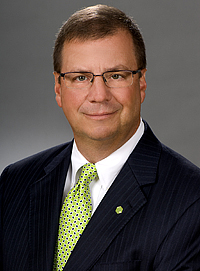
Richard J. Remiker, President of
Huntington Equipment Finance, Elected Chairman
Richard J. Remiker, President of Huntington Equipment Finance, was named Chairman of the Board of the Equipment Leasing and Finance Association (ELFA) at the 51st Annual Convention.
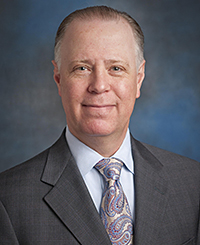
Adam Warner, President of Key Equipment Finance,
was named Chairman-elect.
The Chairman-elect and new board members were recommended by ELFA’s Nominating Committee and approved by a vote of the general membership.
Richard J. Remiker is a 31-year veteran of the commercial equipment finance industry. He has served as President of Huntington Equipment Finance, the equipment leasing arm of Columbus, Ohio-based Huntington Bancshares, since 2010. Prior to joining Huntington, he served as Chief Administrative Officer for RBS Asset Finance. He previously spent five years with Merrill Lynch Capital and nine years with Key Equipment Finance, the last four as President and COO of their mid-sized company market and large-ticket leasing business. He also held positions with U.S. Leasing and CIT Group. He attended Arizona State University and the University of Wisconsin-Milwaukee, where he earned a bachelor’s degree in business administration, majoring in finance.
Mr Remiker has previously served on the ELFA’s Board of Directors as a member of the Executive Committee. He also served as Chairman of the association’s Independent Middle Market Business Council Steering Committee, and most recently was a member of the ELFA Personnel Committee. In addition, he served on the Equipment Leasing & Finance Foundation’s Board of Trustees from 2005-2010.
Adam D. Warner has over 35 years experience in leasing, first holding the position of operations manager at McDonnell Douglas Finance, then working as senior vice president of sales and marketing at Mellon Leasing Corporation, where he had worked since 1988.He joined Key Equipment Finance to oversee the express leasing services business in 2001.
Prior to being named president in 2007, Warner served as president and chief operating officer of Key Equipment Finance’s commercial leasing services business. Today out of his office outside Denver, Colorado, he manages an approximate $8 billion equipment portfolio with annual originations in excess of $3 billion. The company has management and operations bases in Albany, New York; London, England; Frankfurt, Germany; Madrid, Spain; Milan, Italy; Paris, France and Toronto, Canada. The company, which supports clients in over 30 countries, employs approximately 600 people worldwide.
Warner is a member of the Equipment Leasing and Finance Association’s board of directors, serves on the organization’s executive committee and is Vice Chairman. He is also on the Executive Advisory Board for the Regis University School of Management and he is a member of Elmhurst College’s Center for Business and Economics Director’s Circle.
The new members of the ELFA Board of Directors include:
· Bill Besgen, President, Hitachi Capital America Corp.
· Daniel Dyer, Co-founder and Chief Executive Officer of Marlin Business Services Corp.
Christopher Enbom, CLP, Co-Founder and CEO, Allegiant Partners
· Ed Hetherington, President, Doosan Infracore Financial Solutions
· John McQueen, Executive Vice President, Wells Fargo Equipment Finance
· Scott Thacker, President, Ivory Consulting Corporation
Robert J. Rinaldi, Executive Vice President, CSI Leasing; James McGrane, President and CEO, EverBank Commercial Finance; and William Stephenson, Chairman, Global Vendor Finance, De Lage Landen International were elected by the membership to serve as ELFA Vice Chairs. Thomas M. Jaschik, President, BB&T Equipment Finance, continues to serve as Treasurer, and Paul Stilp, ELFA’s Vice President of Finance and Administration, continues to serve as Secretary. William G. Sutton, CAE, serves as President and CEO.
Crit DeMent, Chairman and CEO of LEAF Commercial Capital, Inc., is Immediate Past Chairman.
In addition to Besgen, Dyer, Enbom, Hetherington, McQueen and Thacker, the following are also members of the ELFA Board of Directors:
· Kent Adams, President, Caterpillar Financial Services Corporation
· Tom Askounis, President, Askounis & Darcy, P.C.
· Robert Boyer, President, Susquehanna Commercial Finance
· Susan Carol, CEO, Susan Carol Associates Public Relations
· Anthony Cracchiolo, President & CEO, Vendor Services, US Bancorp Equipment Finance
· Stan Herkelman, President, GreatAmerica Leasing Corporation
· Daniel McCabe, Senior Vice President, Sales and Marketing, U.S. and Canada, John Deere Financial
· Fred Sasser, Chairman & CEO, Sasser Family Holdings, Inc.
· David T. Schaefer, Chairman & CEO, Orion First Financial, LLC
· Larry A. Smilie, Managing Director, Banc of America Leasing
· Jud Snyder, President, BMO Harris Equipment Finance Company
· Louis J. Vigliotti, Senior Managing Director, GE Capital Markets Group
· Derek C. Wilkins, Vice President, Global Lease Operations, Steelcase Financial Services
 |
[headlines]
--------------------------------------------------------------
Leasing News Remains WWW Webnews #1

Third Party analysis and record keeping Urchin numbers continue to show Leasing News as the number one trade publication for the leasing industry, which also includes banks and finance institutions.
Alexa for ten years has ranked Leasing News first among internet readers for news in the leasing industry in the United States as well as the most read from the United states in other countries.
The numbers are more impressive in considering the other media are five times a week where Leasing News is usually Monday-Wednesday-Friday---three times a week.
US |
WW |
Links |
Web Site |
|
| 1 | 31,063 |
183,774 |
243 |
LeasingNews.com |
| 2 | 95,186 |
359,084 |
64 |
Lessors.com |
| 3 | 178,375 |
695,739 |
174 |
Monitor Daily |
| 4 | 193,811 |
1,312,702 |
60 |
Equipment Finance Advisor |
| 5 | 249,366 |
773,962 |
337 |
ELFAonline.org |
| 6 | 316,893 |
1,507,121 |
78 |
NEFAssociation.org |
| 7 | 328,722 |
1,442, 544 |
173 |
Commercial Finance Association |
| 8 | 388,690 |
1,702,487 |
139 |
NAELB.org |
| 9 | 394,268 |
1,996,988 |
76 |
Worldleasingnews.com |
| 10 | 471,014 |
2,500,147 |
142 |
Equip. Leasing Finance Foundation |
| 11 | no data |
2,838,401 |
37 |
CLPFoundation.org |
| 12 | no data |
12,718,448 |
23 |
Assoc. Gov. Leasing/Finance |
(October 23, 2012)
The Alexa tool bar works on most browsers, owned by Amazon. They are partnered with Google. www.alexa.com
 |
[headlines]
--------------------------------------------------------------
Ten Nations that Control the World's Gold
24/7WallSt.com

10)
India
Gold reserves: 557.7 tonnes
Pct. of total foreign reserves: 10.0%
GDP: $1.82 trillion (10th highest)
Stock performance: Bombay BSE up 7.6% in Q3, up 21% YTD
9)
Netherlands
Gold reserves: 612.5 tonnes
Pct. of total foreign reserves: 59.8%
GDP: $838 billion (17th highest)
Stock performance: AEX up 5.1% in Q3, up 3.4% YTD
8)
Japan
Gold reserves: 765.2 tonnes
Pct. of total foreign reserves: 3.2%
GDP: $5.86 trillion (3rd highest)
Stock performance: Nikkei 225 fell 1.5% in Q3, up 4.6% YTD
7)
Russia
Gold reserves: 936.7 tonnes
Pct. of total foreign reserves: 9.6%
GDP: $1.85 trillion (9th highest)
Stock performance: MICEX down near 4% in Q3, negative YTD
6)
Switzerland
Gold reserves: 1,040.1 tonnes
Pct. of total foreign reserves: 11.5%
GDP: $660 billion (19th highest)
Stock performance: Swiss Market up 7% in Q3, up 9.4% YTD
5)
China
Gold reserves: 1,054.1 tonnes
Pct. of total foreign reserves: 1.7%
GDP: $7.3 trillion (2nd largest)
Stockperformance: Shanghai Composite 6.6% lower in Q3, 5.4% lower YTD
4)
France
Gold reserves: 2,435.4 tonnes
Pct. of total foreign reserves: 71.6%
GDP: $2.77 trillion (5th largest)
Stock performance: CAC rose 4.9% in Q3, up 6.1% YTD
3)
Italy
Gold reserves: 2,451.8 tonnes
Pct. of total foreign reserves: 72.0%
GDP: $2.2 trillion (8th largest)
Stock performance: Borsa Italiana MIB rose 5.7% in Q3, flat YTD
2)
Germany
Gold reserves: 3,395.5 tonnes
Pct. of total foreign reserves: 72.4% of foreign reserves
GDP: $3.6 trillion (4th largest)
Stock performance: DAX rose 12.4% in Q3, up 22.3% YTD
1)
United States
Gold reserves: 8,133.5 tonnes
Pct. of total foreign reserves: 75.4%
GDP: $15 trillion in GDP (the largest)
Stock performance: S&P 500 up 5.7% in Q3, up 14.5% YTD
Full Story: Ten Nations that Control the World's Gold
http://247wallst.com/2012/10/19/ten-nations-that-control-the-worlds-gold/2/
Leasing News Online Our ads reach those in the banking, finance, Leasing News has many repeat advertisers Cost Logo is Free $595 four HTML lines (note, a space is counted as a line) Company information and web site at bottom The classified ad will appear for 21 days. |
[headlines]
--------------------------------------------------------------
TARP redemptions: It's payback time
By Tahir Ali and Fahad Mir, SNL Financial
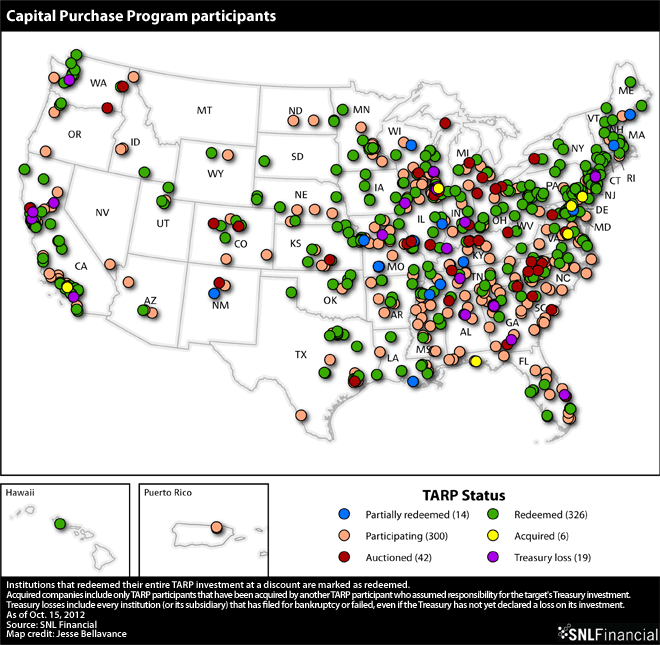
The number of banks and thrifts that have exited the U.S. Treasury Department's TARP investment has increased to 367, which includes 326 that redeemed and 41 that were auctioned. This brings the tally of companies on which TARP has recovered some or all of its investment, including partial redeemers and those auctioned, to 382 of the 707 financial institutions that received funds under the program, according to the Treasury’s Oct. 10 investment transaction report. Since Sept. 26, more than $750 million has been recovered from banks and thrifts, increasing the total to nearly $232.8 billion.

Of the four institutions from which the Treasury has recovered its investment during this period, the most notable name and largest redeemer among the group, Zions Bancorp., paid a second and final $700 million installment to the U.S. Treasury to exit TARP entirely. The bank had made its first payment of the same amount back on March 28.
Three other banks fully redeemed their TARP investments to exit the program: Winston-Salem, N.C.-based Southern Community Financial Corp.; Fairlawn, Ohio-based Central Federal Corp.; and Pittsburgh, Pa.-based TriState Capital Holdings Inc.
Although the U.S. Treasury has made clear its intentions to auction a large portion of its remaining TARP holdings, either individually or pooled together, all four institutions that exited the program from Sept. 26 through Oct. 8 paid for their investments themselves or through an acquirer instead of having their TARP equity auctioned. There are now only two banks remaining that have TARP amounts outstanding similar to that of Zions, Synovus Financial Corp. and Popular Inc.
Southern Community Financial Corp. was acquired by Coral Gables, Fla.-based Capital Bank Financial Corp. As part of the acquisition, Capital Bank also acquired all of the securities issued by Southern Community to the U.S. Department of the Treasury.
![]()
Why Choose Advanced Property Tax Compliance?
|
Dedicated to the leasing industry |
[headlines]
--------------------------------------------------------------
Why I Became a CLP

James "Jim" E. Coston, Esq.

"I would like to hear from the newer CLP's and hope Leasing News starts writing about them, rather than people like myself. Barry Marks in his report said he thought I was the first attorney to become a CLP, although my recollection is that it was either he or Joe Bonanno. I know I was the first attorney to serve as President of the United Association of Equipment Leasing (UAEL), now the National Equipment Finance Association.
"I believe that attaining CLP status is a great accomplishment, and that having it as an industry measure for professionalism and ethics is extraordinarily important.
"In my representation of clients I have always prided myself on understanding the business my leasing clients were in, not just the law, so to me it was a natural.
“Once I was first elected to the UAEL Board in 1998, I considered becoming a CLP a priority. But we're all busy, and I never set aside the time to study and take the exam. Later, I was asked to help then-UAEL Executive Director Ray Williams set up the CLP Foundation as a stand-alone organization, which we accomplished.
"When I was elected Secretary-Treasurer of UAEL, I made a commitment to myself that I would become a CLP before becoming President. Bob Rodi and others frequently offered to tutor me. Finally, Jim McCommon, one of those who had always offered to tutor me, suggested to Marci Slagle and me that he would be pleased to tutor us in Seattle and have us take the exam. We accepted.
"We spent a day with Jim going through the exam, with some assistance in the afternoon from Terey Jennings. Marci took the exam the following day. I took it several weeks later (I hesitated because I was so intimidated by the math section).
"I remember it being a full-day exam, with more writing than I recall since taking the bar exam almost 25 years earlier.
"I was very nervous about my test results, which I was advised of at the UAEL 2002 Spring Conference in Rancho Mirage. It really felt great to past this test. In all of this, my friends at UAEL were extraordinarily supportive of my interest and efforts towards becoming a CLP, and I can't say enough about Jim McCommon, as well as Terey Jennings. That is what the CLP designation is about. Friends helping friends to achieve this special designation.

(To learn more about the CLP Handbook)
http://www.clpfoundation.org/toolbox/clp_handbook.php
Why I Became a CLP collection
http://www.leasingnews.org/CLP/Index.htm
Mr. Terry Winders available as a consultant regarding assisting attorneys in resolving disputes or explaining procedures or reviewing documents as utilized in the finance and leasing industry. He is the author of several books, including DVD's, as well as weekly columnist to Leasing News. He also performs audits of leasing companies as an expert on documentation, and has acted as an expert witness on leasing for litigation in legal and tax disputes, including before the IRS. He also has taught the senior bank examiners, how to review a bank leasing department, for the Federal Reserve in Washington D.C. and has trained the examiners for the FDIC on how to prepare a lease portfolio for sale. 502.649.0448/Leaseconsulting@msn.com |
(This ad is a “trade” for the writing of this column. Opinions
contained in the column are those of Mr. Terry Winders, CLP)
Send Leasing News to a Colleague. We are free!!!
[headlines]
--------------------------------------------------------------
Beagle Mix--Puppy
Chicago, Illinois Adopt-a-Dog

Ollie
ID# 2416
Male
Small (25lbs or less)
Red/Golden/Orange/Chestnut with White
Puppy: Four Months Old
“I am already neutered, up to date with shots, good with kids, and good with dogs.”
Ollie's Story...
"Hi my name is Ollie! I am a fun loving, adventurous, cuddler.
"I love playing tag with my foster brother and sister so if you have another dog for me to play with that would be excellent! I also like playing with kids. I am growing very quickly and will probably be a good medium sized dog.
"I like to have toys to chew on and balls to fetch. I like to be outside and bark at the wind. I am good on walks and mostly house trained. I have a high level of confidence so I am not scared of loud noises or new experiences. I know a few simple commands and to come when my name is called. I do dig... and I have been known to escape my yard, but I do not run away, just explore and come back as soon as I am called.
I think I would make a great addition for a family who is looking for a perfect puppy to love.
---Message from my foster parents.
"I have had numerous dogs during my life. Ollie is a pretty darn great puppy. He is around 4 months old. I picked him up in a parking lot full of barking dogs in cages from Shelters. He was in a crate with 3 of his brothers and sisters. He was totally focused on me, did not bark, did not back away from me, nor lunge. He was totally confident.
“ He is easy to train and has acclimated to my home in the last 3 weeks. He is crate trained, and will enter his crate and on his own without protest. He is independent and he will watch everything you do and will sleep on your lap if you want him to; he is a very typical male dog. He is far less nose and food driven than other beagles I have had. He really loves other dogs and I would recommend him to a home with another active dog and a fenced-in-yard.
He has finished medication for a parasite (coxcidia) but this will have to be monitored for the first few months. It has been a pleasure fostering Ollie and if we didn't have two other young dogs we would consider keeping him for ourselves.
Contact This Rescue Group...
Rescue Group: BREW Midwest (Beagle Rescue)
Pet ID #: 2416
E-mail: info@gotbeagles.org
Let 'em know you saw "Ollie" on Adopt-a-Pet.com!
Website: http://www.gotbeagles.org
Address: Chicago, IL 60626
Adopt-a-Pet by Leasing Co. State/City
http://www.leasingnews.org/Conscious-Top%20Stories/Adopt_Pet.htm
Adopt a Pet
http://www.adoptapet.
• Contract Negotiations • Fraud Investigations john@jkrmdirect.com | ph 315-866-1167| www.jkrmdirect.com |
(Leasing News provides this ad as a trade for investigations
and background information provided by John Kenny)
[headlines]
--------------------------------------------------------------
### Press Release ###############################
Equipment Finance Sector to Surpass $740 Billion in 2013,
Equipment Leasing & Finance Foundation Forecasts

Palm Desert, CA—The equipment finance market will exceed $740 billion in 2013, according to preliminary data released on Monday by the Equipment Leasing & Finance Foundation from the forthcoming U.S. Equipment Finance Market Study 2012-2013. The Foundation revealed the industry market size and other key highlights from the study today at the Equipment Leasing and Finance Association’s 51st Annual Convention. The full study, which will provide an updated picture of the domestic equipment finance sector, will be released in November.
Highlights from the study, conducted
by IHS Global Insight, include:
· Equipment finance volume has returned to pre-recession levels. The 2012 estimate for the equipment finance market is $725 billion. Current IHS forecasts suggest that the equipment finance market will continue to grow slowly over the next few years.
· The equipment finance sector is a significant contributor to capital formation in the U.S. economy. Of the projected $1.3 trillion invested in plant, equipment and software in 2013, 55 percent, or $742 billion, of that investment is expected to be financed through loans, leases and lines of credit. In 2014, the market size is projected to grow to $778 billion.
· Seventy-two percent of companies use some form of financing, including loans, leases and lines of credit. Thirty percent of companies anticipate increasing their equipment investment in the next 12 months, although smaller companies are more uncertain.
· Companies with sales between $25 million and $100 million doubled their share of leasing volume from 2007 to 2012. This may be in part a reflection on the difficulty in obtaining other forms of credit for this segment of the market.
· Cash as a method of purchasing declined for large companies from 2007 to 2012 as larger companies enjoy greater access to credit markets. In the current interest rate environment the penalty for holding cash is minimal. Companies may also be hanging on to cash in response to the high levels of economic, tax and regulatory uncertainty.
[headlines]
--------------------------------------------------------------
#### Press Release #############################
Final Defendant Sentenced
in Blue Ocean Mortgage Fraud Scheme

LOS ANGELES – Appearing before United States District Judge Manuel L. Real, the final of three defendants was sentenced yesterday for his participation in a mortgage fraud conspiracy operated out of Los Angeles-based Blue Ocean Mortgage Corporation.
Ronald E. Turnage, 36 was sentenced to five years probation. Turnage made significant money from participating in the conspiracy, including commissions and fees based on mortgage loans that he and others fraudulently obtained in the names of “straw borrowers.”
Co-defendants Matthew Kay, 37 and Troy Stroud, 46 were previously sentenced in September and March of this year, respectively. Kay was sentenced to 48 months imprisonment and ordered to pay restitution in the amount of $1,683,000. Stroud was sentenced to 30 months and ordered to pay restitution of $401,000.
All three defendants pleaded guilty this year to conspiracy to commit wire fraud in connection with home mortgage loans. In addition, Kay pleaded guilty to one count of wire fraud and one count of failing to file his 2006 income tax return.
The three defendants participated in a sophisticated conspiracy from 2006 to 2007 to defraud mortgage lenders out of significant money, according to documents filed with the court. Kay, who ran the mortgage brokering company, recruited straw borrowers to fraudulently obtain mortgages. Using the names and credit histories of the straw borrowers, Kay and his co-conspirators submitted loan applications that contained significant false information. For example, Kay and the others falsely stated that the straw borrowers were successfully employed and intended to live in the homes being purchased. In reality, the straw borrowers did not work for the companies for which they were purportedly employed, and did not intend to occupy the homes.
After buying the homes, the defendants frequently flipped the homes by selling them again in staged transactions to new straw borrowers at higher prices. The purpose of this was to obtain new mortgage loans in higher amounts from the defrauded lenders.
The investigation was worked by the Federal Bureau of Investigation and IRS-Criminal Investigation.
#### Press Release #############################
((Please click on ad to learn more))
(Leasing News provides this ad “gratis” as a means
to help support the growth of Lease Police)
[headlines]
--------------------------------------------------------------

(Please let us know if a link has changed, or if there is a company
that should be added to this list. The listing is free.
Contact: kitmenkin@leasingnews.org)
Open Positions at Leasing Funders/Various Locations
(Most of the listing have "open positions." While you may find ones that do not, check back later, as they may have added an opening.)
Advantage Funding
http://www.advantagefund.com/employment.htm
AIG
http://www.aigcorporate.com/addresources/globalcareers.html
Altec
https://careers.altec.com/psc/P90HALT_APP/APPLICANT
/HRMS/c/HRS_HRAM.HRS_CE.GBL?nocrumbs=yes&
Alter Moneta
http://www.altermoneta.com/careers/opportunities.html
Atlas Copco
http://www.atlascopco.com/us/careers/openjobs/
Balboa Capital
http://www.balboacapital.com/about_us/careers.aspx
Bank of America
http://careers.bankofamerica.com/overview/overview.asp
Bank of Ozarks
https://bankozarks.applicantharbor.com/jobmainlist.php?a=m
Bank of the West
https://www.bankofthewest.com/about-us/careers/job-search.html
(type in state, and keyword leasing or category)
CIT Job Openings
http://sj.tbe.taleo.net/SJ1/ats/careers/jobSearch.jsp?org=CIT&cws=1
CSI Leasing
http://www.csileasing.com/ViewJobPostings.aspx
Data Sales
http://www.datasales.com/open_jobs.html
De Lage Landen Financial
https://tbe.taleo.net/NA4/ats/careers/jobSearch.jsp?
org=DELAGELANDEN&cws=1
Direct Capital
http://tbe.taleo.net/NA2/ats/careers/jobSearch.jsp?
org=DIRECTCAPITAL&cws=1
Farm Credit
http://www.farmcreditnetwork.com/careers/opportunities
Financial Pacific
http://www.finpac.com/careers.aspx
Fifth-Third Bank
https://cvg53.cvgs.net/Main/careerportal/JobAgent.cfm
GE Capital
www.ge.com/careers
GreatAmerica Leasing
http://jobs.greatamerica.com/
Hillcrest Bank
https://www.hillcrestbank.com/Careers.aspx
Home Savings Bank
http://www.home-savings-bank.com/careers.php
Huntington Bank
https://www.huntington.com/us/HNB3400.htm
Key Bank
Click here
Marlin Business Services
Key (not available at this time)
https://www.marlinleasing.com/Careers/joblisting.html?location=all
Madi$on Capital
http://www.madisoncapital.com/employment.php?
expandable=3&subexpandable=5
Meridian Bank
https://www.meridianbank.com/careers.html
Microfinancial/Timepayment
http://www.hirebridge.com/jobseeker2/Searchjobresults.asp?cid=5224
Northern California Farm Credit (office listings)
http://www.norcalfc.com/locations.html
People's United Bank
https://www3.ultirecruit.com/PEO1003/JobBoard/ListJobs.aspx
PL Capital
http://www.plcapital.com/careers.asp
Prime Alliance Bank
http://www.primealliancebank.com/home/careers
Regions Bank
https://regions.taleo.net/careersection/2/jobsearch.ftl
Republic Financial
http://tbe.taleo.net/NA8/ats/careers/jobSearch.jsp?
org=REPUBLICFINANCIAL&cws=1
Sterling Bank
https://www.synovus.apply2jobs.com/ProfExt/index.cfm?fuseaction=m
External.showSearchInterface
Taycor Financial
http://www.taycor.com/about-taycor-financial/careers/
TCF Bank
https://tcfbank.taleo.net/careersection/corporate/jobsearch.ftl?lang=en
TD Bank
https://tderec.ijob.com/recruit/servlet/com.lawson.ijob.util.Login
US Bank
(type position in blank space and/or state)
http://www.usbank.com/cgi_w/cfm/careers/careers.cfm
Wells Fargo
https://employment.wellsfargo.com/psp/PSEA/
APPLICANT_NW/HRMS/c/HRS_HRAM.HRS_CE.GBL
Zions Bank
https://zionsbancorp.taleo.net/careersection/
zfnbexternal/jobsearch.ftl?lang=en
Leasing News invites other employers to list their "open positions."
The listing is free.
[headlines]
--------------------------------------------------------------

![]()
News Briefs----
Wells Fargo approves a record $1.24 billion in SBA loans
for America's small businesses
http://www.dailyfinance.com/2012/10/22/wells-fargo-approves-a-record-124-billion-in-sba-l/
CIT Group Posts Wider Loss
http://online.wsj.com/article/
SB10001424052970203630604578074523583608246.html
Caterpillar 3Q Earnings Analysis: Sober
http://seekingalpha.com/article/943271-caterpillar-3q-earnings-analysis-management-discussion-margins-and-valuation
White Clarke Country Surveys Asset & Auto Finance
http://www.whiteclarkegroup.com/knowledge-centre/category/country_reports
Bank of West/BPB Paribus Leasing enhanced equip. finance/leasing
http://www.sacbee.com/2012/10/22/4929263/bank-of-the-west-and-bnp-paribas.html
Yankee Stadium Parking Company Defaults on its Bonds
http://transportationnation.org/2012/10/11/yankees-stadium-parking-company-defaults-on-its-bonds/
Apple Unveils iPad Mini
http://online.wsj.com/article/
SB10001424052970204425904578074681343454060.html
[headlines]
--------------------------------------------------------------

You May Have Missed---
Financing & Credit Score Frustration
http://northshoreadvisory.com/FinancingCreditScoreFrustration.ht m?goback=%2Egde_3258152_member_178029592
[headlines]
--------------------------------------------------------------
SparkPeople--Live Healthier and Longer
![]()
SparkPeople--Live Healthier and Longer
100 Calorie Halloween Treat
http://www.sparkpeople.com/resource/slideshow.asp?show=19
[headlines]
--------------------------------------------------------------

Sports Briefs----
Bruce Bochy announces surprising SF Giants World Series rotation
http://blog.sfgate.com/giants/2012/10/23/bruce-bochy-announces-surprising-sf-giants-world-series-rotation/
Detroit Tigers Arrive In 2012 World Series Well-Rested To Take On Well-Tested San Francisco Giants
http://www.huffingtonpost.com/2012/10/23/detroit-tigers-2012-world-series-san-francisco-giants_n_2007493.html
Transcript of Mike Holmgren's farewell news conference
http://www.crainscleveland.com/article/20121023/FREE/121029955
[headlines]
--------------------------------------------------------------

October
by Hester Jewell Dawson © |
Published: Stone Country (1986) |
the high fly ball, then hold, fixed and dumb and there you have it: the song, then the descent |
[headlines]
--------------------------------------------------------------
![]()
California Nuts Briefs---
Snowfall totals grow in Sierra; Boreal to open Friday
http://www.sacbee.com/2012/10/23/4933036/sacramento-area-weather-storm.html
[headlines]
--------------------------------------------------------------
![]()
“Gimme that Wine”
http://www.youtube.com/watch?v=EJnQoi8DSE8
Vines finishing strong in Northern California
http://www.sonomanews.com/News-2012/Vines-finishing-strong/
12 Individuals From Across The United States Earn The Title Of Advanced Sommelier
http://www.winebusiness.com/news/?go=getArticle&dataid=106459
Vineyard wins top award for organic drop
http://www.hawkesbaytoday.co.nz/news/vineyard-wins-top-award-for-organic-drop/1592823/
2012 New World Wine Experience: Tasting Wine Spectator's Top 10 Wines of 2011
http://www.winespectator.com/webfeature/show/id/47503
Free Mobile Wine Program
http://leasingnews.org/archives/Feb2010/2_26.htm#mobile
Wine Prices by vintage
http://www.winezap.com
http://www.wine-searcher.com/
US/International Wine Events
http://www.localwineevents.com/
Winery Atlas
http://www.carterhouse.com/atlas/\
Leasing News Wine & Spirits Page
http://two.leasingnews.org/Recommendations/wnensprts.htm
[headlines]
----------------------------------------------------------------
![]()
This Day in History
1742--With the outbreak of war between Britain and Spain in 1740 the British authorities decided to capture the Spanish colony of Cartagena (today the nation of Columbia) in South America. Two colonies, Georgia and South Carolina, were too involved in their own ‘war’ against Indian raids coming from Spanish Florida to aid in the Cartagena campaign. From the remaining 11 colonies a huge regiment numbering almost 3,500 men was organized. It was known by several designations as the 61st Regiment of Foot, the American Regiment and probably most frequently as “Gooch’s Regiment” after Virginia’s Governor, William Gooch, who served as its colonel. Keeping with the regional composition of the regiment, the 1st Battalion was composed of men from New England, the 2nd from New Jersey and New York, the 3rd from Pennsylvania and Delaware and the 4th from Maryland, Virginia and North Carolina. Commanding a Virginia company in the 4th Battalion was Captain Lawrence Washington, older brother of George. The expedition proved an utter failure, due to incompetence in leadership and poor planning which had the men involved in a siege operation during the height of the malaria and yellow fever season. Only about 600 men survived the expedition. Perhaps the most lasting effect of the entire venture was when Lawrence Washington returned home he named his plantation “Mount Vernon” in honor of Admiral Edward Vernon, the British naval commander of the expedition. When Lawrence died in 1752 and George inherited the property he retained the name, which it still carries today.
1755 - A British expedition against the French held Fort Niagara in Canada ended in failure. British Governor William Shirley determined that this makeshift navy had been unable to prevent French reinforcement and resupply of the fort and decided to delay the planned attack on Niagara until 1756.
1785 - A four day rain swelled the Merrimack River in New Hampshire and Massachusetts to the greatest height of record causing extensive damage to bridges and mills.
1788--Birthday of Sarah Josepha Hale, for 40 years co-edited the fashion and literary magazine Godey's Lady's Book, 150,000 circulation, which vigorously promoted women's causes, particularly college for women and women doctors.
1839-Biurthday of Belva A. Lockwood, an educator, lawyer and advocate for women's rights, born at Royalton, NY. In 1879, she was admitted to practice before the US Supreme Court—the first woman to do so. While practicing law at Washington, DC, she secured equal property rights for women. By adding amendments to statehood bills, Lockwood helped to provide voting rights for women in Oklahoma, New Mexico and Arizona. In 1884, she was the first woman formally nominated for the US presidency. Died May 19, 1917, at Washingotn, DC.
1861-Transcontinental telegraph line was placed in operation when Stephen Johnson Field, chief justice of California, sent a message to President Abraham Lincoln. On October 25, 1861, telegrams were exchanged between Mayor Fernando Wood of New York City and Mayor H.F. Teschemacher of San Francisco, CA. Rates during the first week were $1 a word between San Francisco and the Missouri River. Later the rates were reduced: 10 words from San Francisco to New York City cost $6, and each additional word cost 75 cents. The obstacles to building the line over the sparsely populated and isolated western plains and mountains were huge. Wire and glass insulators had to be shipped by sea to San Francisco and carried eastward by horse-drawn wagons over the Sierra Nevada. Supplying the thousands of telegraph poles needed was an equally daunting challenge in the largely treeless Plains country, and these too had to be shipped from the western mountains. Indians also proved a problem. In the summer of 1861, a party of Sioux warriors cut part of the line that had been completed and took a long section of wire for making bracelets. Later, however, some of the Sioux wearing the telegraph-wire bracelets became sick, and a Sioux medicine man convinced them that the great spirit of the "talking wire" had avenged its desecration. Thereafter, the Sioux left the line alone, and the Western Union was able to connect the East and West Coasts of the nation much earlier than anyone had expected and a full eight years before the transcontinental railroad would be completed.
http://memory.loc.gov/ammem/today/oct24.html
1861 - West Virginia seceded from Virginia. Residents of thirty-nine counties in western Virginia approved the formation of a new Unionist state. The accuracy of these election results have been questioned, since Union troops were stationed at many of the polls to prevent Confederate sympathizers from voting. At the Constitutional Convention, which met in Wheeling from November 1861 to February 1862, delegates selected the counties for inclusion in the new state of West Virginia. From the initial list, most of the counties in the Shenandoah Valley were excluded due to their control by Confederate troops and a large number of local Confederate sympathizers. In the end, fifty counties were selected (all of present-day West Virginia's counties except Mineral, Grant, Lincoln, Summers, and Mingo, which were formed after statehood). The Baltimore and Ohio Railroad, which ran through the Eastern Panhandle, was extremely important for the economy and troop movements. Inclusion of these counties removed the entire railroad from the Confederacy.
1878 - A hurricane produced widespread damage across North Carolina, Virginia, Maryland, New Jersey and Pennsylvania. At Philadelphia PA, the hurricane was the worst of record.
1892-Black workers strike in New Orleans, LA
1908 -Baseball's anthem, Take Me Out to the Ballgame, is introduced by Bill Murray. The song writing team of Albert Von Tilzer (music) and Jack Norworth (words) who created the immortal tune have never seen a game. The story goes Jack Norworth one was riding a New York City subway train, he spotted a sign that said "Ballgame Today at the Polo Grounds." Some baseball-related lyrics popped into his head, that were later set to some music by Albert Von Tilzer, to become the well known baseball song, "Take Me Out To The Ballgame." Despite the fact that neither Norworth or Tilzer had ever been to a baseball game at the time the song was written, it is one of the most widely sung songs in America. Here is the most adopted 1927 version:
http://www.niehs.nih.gov/kids/lyrics/ballgame.htm
http://www.discoverynet.com/~ajsnead/alpcond/alpha_20/midi/ballgame.mid
1914-birthday of alto sax player Jimmie Powell, New York City, NY
1915--DALY, DANIEL JOSEPH (Second Award) Medal of Honor
Rank and organization: Gunnery Sergeant, U.S. Marine Corps. Born: Glen Cove, Long Island, N.Y., 11 November 1873. Accredited to: New York. Other Navy awards: Second Medal of Honor, Navy Cross. Citation: Serving with the 15th Company of Marines on 22 October 1915, G/Sgt. Daly was one of the company to leave Fort Liberte, Haiti, for a 6-day reconnaissance. After dark on the evening of 24 October, while crossing the river in a deep ravine, the detachment was suddenly fired upon from 3 sides by about 400 Cacos concealed in bushes about 100 yards from the fort. The marine detachment fought its way forward to a good position, which it maintained during the night, although subjected to a continuous fire from the Cacos. At daybreak the marines, in 3 squads, advanced in 3 different directions, surprising and scattering the Cacos in all directions. G/Sgt. Daly fought with exceptional gallantry against heavy odds throughout this action.
1915--OSTERMANN, EDWARD ALBERT Medal of Honor
Rank and organization: First Lieutenant, U.S. Marine Corps, 15th Company of Marines (mounted). Place and date: Vicinity Fort Liberte, Haiti, 24 October 1915. Entered service at: Ohio. Born: 1883, Columbus, Ohio. Citation: In company with members of the 15th Company of Marines, all mounted, 1st Lt. Ostermann left Fort Liberte, Haiti, for a 6-day reconnaissance. After dark on the evening of 24 October 1915, while crossing the river in a deep ravine, the detachment was suddenly fired upon from 3 sides by about 400 Cacos concealed in bushes about 100 yards from the fort. The marine detachment fought its way forward to a good position, which it maintained during the night, although subjected to a continuous fire from the Cacos. At daybreak, 1st Lt. Ostermann, in command of 1 of the 3 squads which advanced in 3 different directions, led his men forward, surprising and scattering the Cacos, and aiding in the capture of Fort Dipitie.
1915-UPSHUR, WILLIAM PETERKIN Medal of Honor
Rank and organization: Captain, U.S. Marine Corps. Born: 28 October 1881, Richmond, Va. Appointed from: Virginia. Citation: In company with members of the 15th Company of Marines, all mounted, Capt. Upshur left Fort Liberte, Haiti, for a 6-day reconnaissance. After dark on the evening of 24 October 1915, while crossing the river in a deep ravine, the detachment was suddenly fired upon from 3 sides by about 400 Cacos concealed in bushes about 100 yards from the fort. The marine detachment fought its way forward to a good position which it maintained during the night, although subjected to a continuous fire from the Cacos. At daybreak, Capt. Upshur, in command of one of the 3 squads which advanced in 3 different directions led his men forward, surprising and scattering the Cacos, and aiding in the capture of Fort Dipitie.
1920- bassist Wendell Marshall born St. Louis, Mo, with Duke Ellington 1948-1955.
1926 – Birthday of Y.A. (Yelberton Abraham) Tittle, Jr. , born Marshall, TX. (Pro Football Hall of Famer: NY Giants, San Francisco 49ers, Baltimore Colts: quarterback; UPI Player of the Year [1957, 1962]; AP Player of the Year [1963])
1927-Surrealist poet Philip Lamantia born in born in San Francisco, California. Expelled from a junior high school for “intellectual delinquency,”
1929- Black Thursday---after several weeks of a downward trend in stock prices, investors began panic selling on Black Thursday, October 24, 1929. More than 13 million shares were dumped. Desperate attempts to support the market brought a brief rally. By December 1 stocks on the New York Stock Exchange had dropped in value by $26,000,000. the day after the crash, Pres. Herbert Hoover said, " The fundamental business of the country...is on a sound and prosperous basis." In actuality, the Great Depression of the 1930's began.
1930—Singer Big Bopper ( J.P. Richardson) Birthday
http://www.fiftiesweb.com/crash.htm
http://www.geocities.com/SunsetStrip/Stage/5867/mainpage.html
1931 - The George Washington Bridge was opened, linking New York City with New Jersey. The bridge became a famous New York landmark and has been featured in many movies and TV shows. The toll to cross the bridge was to be temporary -- just to cover costs. But it costs and costs and costs when you have to keep repairing and painting a bridge that big -- so, the bridge toll continues. And the bridge is still being painted.
1931- Alphonse Capone, better known as "Scarface" , was sentenced in a federal court in Chicago for 11 years imprisonment and a $50,000 fine for failing to pay $231,000 in federal income taxes. After years of local and state alleged efforts to get this mobster, the feds were able to collect enough accounting information to sentence him. Capone, who ruled Chicago's illicit beer and liquor trade during Prohibition had a crime organization netting him an estimated $100 million a year in the late 20's, little of which he declared to the government.
1935- Mike Riley-Eddie Farley record " The Music Goes Round and Round," Decca.
1935-Langston Hughes' “Mulatto” opens, the first Black-authored play to become a long-run Broadway hit.
1937-Birthday of sax player/composer Odean Pope, Ninety-Six, SC
http://www.odeanpope.com/
1939 - Women's nylon hosiery went on sale for the first time -- at Wilmington Dry Goods in Wilmington, DE. Why Wilmington? The Dupont Company, the inventor of nylon, is based there.
1939- Benny Goodman records "Let's Dance"
1944--McCAMPBELL, DAVID Medal of Honor
Rank and organization: Commander, U.S. Navy, Air Group 15. Place and date: First and second battles of the Philippine Sea, 19 June 1944. Entered service at: Florida. Born: 16 January 1 910, Bessemer, Ala. Other Navy awards: Navy Cross, Silver Star, Legion of Merit, Distinguished Flying Cross with 2 Gold Stars, Air Medal. Citation: For conspicuous gallantry and intrepidity at the risk of his life above and beyond the call of duty as commander, Air Group 15, during combat against enemy Japanese aerial forces in the first and second battles of the Philippine Sea. An inspiring leader, fighting boldly in the face of terrific odds, Comdr. McCampbell led his fighter planes against a force of 80 Japanese carrier-based aircraft bearing down on our fleet on 19 June 1944. Striking fiercely in valiant defense of our surface force, he personally destroyed 7 hostile planes during this single engagement in which the outnumbering attack force was utterly routed and virtually annihilated. During a major fleet engagement with the enemy on 24 October, Comdr. McCampbell, assisted by but l plane, intercepted and daringly attacked a formation of 60 hostile land-based craft approaching our forces. Fighting desperately but with superb skill against such overwhelming airpower, he shot down 9 Japanese planes and, completely disorganizing the enemy group, forced the remainder to abandon the attack before a single aircraft could reach the fleet. His great personal valor and indomitable spirit of aggression under extremely perilous combat conditions reflect the highest credit upon Comdr. McCampbell and the U.S. Naval Service.
1944--O'KANE, RICHARD HETHERINGTON Medal of Honor
Rank and organization: Commander, U.S. Navy, commanding U.S.S. Tang. Place and date: Vicinity Philippine Islands, 23 and 24 October 1944. Entered service at: New Hampshire. Born: 2 February 1911, Dover, N.H. Citation: For conspicuous gallantry and intrepidity at the risk of his life above and beyond the call of duty as commanding officer of the U.S.S. Tang operating against 2 enemy Japanese convoys on 23 and 24 October 1944, during her fifth and last war patrol. Boldly maneuvering on the surface into the midst of a heavily escorted convoy, Comdr. O'Kane stood in the fusillade of bullets and shells from all directions to launch smashing hits on 3 tankers, coolly swung his ship to fire at a freighter and, in a split-second decision, shot out of the path of an onrushing transport, missing it by inches. Boxed in by blazing tankers, a freighter, transport, and several destroyers, he blasted 2 of the targets with his remaining torpedoes and, with pyrotechnics bursting on all sides, cleared the area. Twenty-four hours later, he again made contact with a heavily escorted convoy steaming to support the Leyte campaign with reinforcements and supplies and with crated planes piled high on each unit. In defiance of the enemy's relentless fire, he closed the concentration of ship and in quick succession sent 2 torpedoes each into the first and second transports and an adjacent tanker, finding his mark with each torpedo in a series of violent explosions at less than l,000-yard range. With ships bearing down from all sides, he charged the enemy at high speed, exploding the tanker in a burst of flame, smashing the transport dead in the water, and blasting the destroyer with a mighty roar which rocked the Tang from stem to stern. Expending his last 2 torpedoes into the remnants of a once powerful convoy before his own ship went down, Comdr. O'Kane, aided by his gallant command, achieved an illustrious record of heroism in combat, enhancing the finest traditions of the U.S. Naval Service.
1945 - The United Nations charter took effect on this day -- at the San Francisco Conference -- establishing the United Nations. 51 countries came together determined to save succeeding generations from the scourge of war; to reaffirm faith in human rights; to promote social progress and better standards of life; to practice tolerance and live together in peace and unite their strength to maintain international peace and security. Since 1971, by unanimous request of the U.N. General Assembly (the world's forum for discussing matters affecting world peace and security), this day has been observed throughout all UN member nations as a public holiday, United Nations Day.
( lower half of:http://memory.loc.gov/ammem/today/oct24.html )
1947 - The Bar Harbor holocaust occurred in Maine when forest fires consumed homes and a medical research institute. The fires claimed 17 lives, and caused thirty million dollars damage.
1951 - Sacramento, CA, reported a barometric pressure of 29.42 inches, to establish a record for October
1951 - The largest air battle of the Korean War occurs at 150 MiGs attack a formation of B-29s escorted by 55 F-84 Thunderjets. Four of the bombers were destroyed and three others seriously damaged and one F-84 was lost. Eight MiGs were destroyed (an additional two probably destroyed) and 10 others heavily damaged.
1952 - Gen. Dwight D. Eisenhower in Detroit, delivered his famous speech about Korea. He promised to go to Korea and seek “an early settlement to the war” if elected President. He was -- and he did.
1956-the first Presbyterian female minister, the Reverent Margaret Ellen Towner, was ordained in her home church in Syracuse, NY. She was appointed minister of Christian education of the First Presbytery Church, Allentown, PA. She had received a Bachelor of Divinity degree form Union Theological Seminary, New York City, in 1954.
1956---Top Hits
Honky Tonk (Parts 1 & 2) - Bill Doggett
Love Me Tender - Elvis Presley
The Green Door - Jim Lowe
Hound Dog/Don't Be Cruel - Elvis Presley
1956-Elvis receives his first letter from the local draft board concerning his draft status.
1958-One of my favorite mystery writers, Raymond Chandler, starts working on his last novel this day, The Poodle Springs Story, but he will die before completing it. Chandler was born in 1888 in Chicago. He was raised in England, where he went to college and worked as a freelance journalist for several newspapers. During World War I, Chandler served in the Royal Flying Corps. After the war, he moved to California, where he eventually became the director of several independent oil companies. He lost his job during the Depression and turned to writing to support himself at the age of 45. He published his first stories in the early 1930s in the pulp magazineBlack Mask and published his first novel, The Big Sleep, in 1939. He published only seven novels, among them Farewell My Lovely (1946) and The Long Goodbye (1953), all featuring tough, cynical detective Philip Marlowe. William Faulkner wrote the screen version of The Big Sleep, which starred Humphrey Bogart as Philip Marlow. Chandler also wrote Hollywood screenplays in the 1940s and early 50s, including Double Indemnity (1949) and Strangers on a Train (1951). He died in March 1959. There was a desert wind blowing that night. It was one of those hot, dry, Santa Ana's that come down through the mountain passes and curl your hair and make your nerves jump and your skin itch. On nights like that, every booze party ends in a fight. Meek little wives feel the edge of the carving knife and study their husbands' necks. Anything can happen."
http://www.kirjasto.sci.fi/rchandle.htm
http://www.america.net/~davdmock/chandler.htm
http://www.bookreporter.com/authors/au-chandler-raymond.asp
http://www.usatoday.com/weather/wsanta.htm
http://www.britannica.com/eb/article?eu=114902&tocid=10134&query=seth%
20carlo%20chandler
1960 - Brenda Lee hit #1 for the second time in the year with "I Want to Be Wanted". 1960 was a very good year for the young (age 15) songstress. In addition to her first #1 smash, "I'm Sorry" (July 18), Lee had two other songs on the charts: "Sweet Nothin's" (#4, April 18) and "That's All You Gotta Do" (#6, July 4).
1960- Neil Sedaka records "Calendar Girl", which will reach #4 in the US early the following year.
1960-Frank Sinatra had the #1 LP on the US album chart with "Nice 'n' Easy".
1962- James Brown's appearance at the Apollo Theatre in New York was recorded for a live album called "Live At the Apollo". The LP would go on to sell over a million copies and earn a reputation for being one of the finest concert albums ever made and was listed at #24 in Rolling Stone Magazine's 2003 list of the 500 greatest albums of all time.
1962 - The U.S. blockade of Cuba during the missile crisis officially began under a proclamation signed by President Kennedy. Atlantic Fleet begins quarantine operations to force Soviet Union to agree to remove ballistic missiles and long range bombers from Cuba. On the day the quarantine was to take effect, the alignment of Soviet and free world nations continued to develop rapidly.
1963-- Bob Dylan records "The Times They Are A-Changin'," "One Too Many Mornings"
1964—Top Hits
Do Wah Diddy Diddy - Manfred Mann
Last Kiss - J. Frank Wilson & The Cavaliers
We'll Sing in the Sunshine - Gale Garnett
I Don't Care (Just as Long as You Love Me) - Buck Owens
1964-- The Santa Barbara, CA Civic Center hosts the historic Teenage Music International Show (later known as TAMI), featuring Chuck Berry, The Supremes, The Beach Boys, James Brown, Marvin Gaye, The Rolling Stones, The Miracles, Jan and Dean, Lesley Gore, Gerry and the Pacemakers, and Billy J. Kramer and the Dakotas.
1966--The Yardbirds and Country Joe and the Fish appear at the San Francisco Fillmore.
1968 - At the National Air and Space Administration test pilot Bill Dana was at the controls of the North American X-15 rocket-propelled research aircraft when it made the 199th--and what turned out to be the final--flight of the X-15 program. He was flying the X-15-1, which had been the first of three aircraft to participate in a series of tests that spanned a decade and resulted in major advances for America's space flight program. In the course of that research, the X-15s spent 18 hours flying above Mach 1, 12 hours above Mach 2, nearly 9 hours above Mach 3, almost 6 hours above Mach 4, one hour above Mach 5 and a few short minutes above Mach 6. The X-15 was hailed by the scientific community as the most successful research aircraft of all time.
1969 - Unseasonably cold air gripped the northeastern U.S. Lows of 10 degrees at Concord, NH, and 6 degrees at Albany NY established October records
1972—Top Hits
My Ding-A-Ling - Chuck Berry
Burning Love - Elvis Presley
Nights in White Satin - The Moody Blues
Funny Face - Donna Fargo
1973-Art Garfunkel is awarded a gold album for his first solo L.P. "Angel Clare" which contains the hit, "All I Know".
1977- the first jockey to win more than $5 million in purses in one year was Steve Cauthen of Kentucky, whose purses this day amounted to $5,009,692.
1980-The British government presented Paul McCartney with a rhodium-plated medallion for being named "the best selling songwriter and recording artist in history", by The Guinness Book of Records. Since 1962, McCartney wrote or co-wrote 43 million-selling songs and sold over 100 million records.
1980—Top Hits
Another One Bites the Dust - Queen
Woman in Love - Barbra Streisand
He's So Shy - Pointer Sisters1988
Groovy Kind of Love - Phil Collins
What's on Your Mind (Pure Energy) - Information Society
Wild, Wild West - The Escape Club
Gonna Take a Lot of River - The Oak Ridge Boys
I Believe in You - Don Williams
1987-Michael Jackson held the top spot on the Billboard singles chart with "Bad"
1987 - Snow fell across northeast Minnesota and northwest Wisconsin overnight, with five inches reported at Poplar Lake MN and Gunflint Trail MN. Thunderstorm rains caused flash flooding in south central Arizona, with street flooding reported around Las Vegas NV. Strong northwesterly winds gusting to 50 mph downed some trees and power lines in western Pennsylvania and the northern panhandle of West Virginia.
1989 - A storm in the western U.S. produced up to three feet of snow in the mountains around Lake Tahoe, with 21 inches reported at Donner Summit. Thunderstorms in northern California produced 3.36 inches of rain at Redding to establish a 24 hour record for October, and bring their rainfall total for the month to a record 5.11 inches. Chiefly "Indian Summer" type weather prevailed across the rest of the nation. Fifteen cities in the north central U.S. reported record high temperatures for the date as readings soared into the 70s and 80s. Record highs included 74 degrees at International Falls MN, and 86 degrees at Yankton SD.
1989-- The Rock and Roll Hall of Fame announces its 4th annual inductees: The Who, Simon and Garfunkel, The Kinks, The Platters, Hank Ballard, Bobby Darin, The Four Seasons, The Four Tops, the Holland-Dozier-Holland songwriting team, Carole King, and Gerry Goffin.
1991- The final frontier for Gene Roddenberry, writer, best known for the creation of
“Star Trek.”
1992 -- The Toronto Blue Jays defeated the Atlanta Braves, 4-2, in 11 innings in Game 6 to become the first non-US-based team to win the World Series. Forty-one year old Dave Winfield's 11th inning double is the key hit in Toronto's victory.1996-- Berry Gordy is awarded a star on the Hollywood Walk of Fame at 7000 Hollywood Blvd.
1996-- Berry Gordy is awarded a star on the Hollywood Walk of Fame at 7000 Hollywood Blvd.
2000- Orlando Hernandez (8-0, 1.90) losses his first postseason game as the Mets defeat the Yankees on a tie breaking eight inning double by Benny Agbayani, 4-2. New York native John Franco gets the win ending the Yankees' record 14-game World Series winning streak.
2000- Roger Clemens is fined a reported $50,000 for throwing the jagged barrel of a shattered bat in the direction of Met catcher Mike Piazza in the first inning Game 2 of the World Series
2002 - John Allen Muhammad (41), an Army veteran who recently converted to Islam, and John LeeMalvo (17) were arrested near Frederick, Maryland, in connection with the sniper shootings that left 10 dead and 3 wounded. In 2003 a judge ruled that Malvo could be tried as an adult. Muhammad began to argue his own defense on Oct 20.
2005 - Hurricane Wilma reached the U.S. coastline near Everglades City in Florida with maximum sustained winds near 120 mph. The hurricane accelerated across south Florida and the Miami/Fort Lauderdale area, exiting the coast later the same day. There were 10 fatalities in Florida, and nearly 6 million people lost power, the most widespread power outage in Florida history. Preliminary estimates of insured losses in Florida were over $6 billion, while uninsured losses were over $12 billion.
2007- In a 13-1 rout of the Rockies, Red Sox second baseman Dustin Pedroia becomes the second player, and first rookie to hit a leadoff home run in a World Series opener. The 24-year old freshman, the 31st major leaguer to homer in his first Fall Classic appearance, joins Orioles' outfielder Don Buford who went yard in 1969 as a leadoff batter in Game 1 off Tom Seaver of the Mets.
2011 -With the help of a mismanaged Cardinal bullpen, Mike Napoli gives his team 3-2 Series lead when he hits a two-run double in the bottom of the eighth inning of the Rangers to a 4-2 victory in Game 5 in Arlington. The Texas catcher, who bats eighth in the order, becomes only the second player to have four multi-RBI games in a World Series, joining Yankee legend Mickey Mantle who accomplished the feat against Pittsburgh in 1960.
World Series Champions This Date
1992 Toronto Blue Jays
-------------------------------------------------------------
SuDoku

The object is to insert the numbers in the boxes to satisfy only one condition: each row, column and 3x3 box must contain the digits 1 through 9 exactly once. What could be simpler?
http://leasingnews.org/Soduku/soduko-main.htm
--------------------------------------------------------------
Daily Puzzle

How to play:
http://www.setgame.com/set/puzzle_frame.htm
Refresh for current date:
http://www.setgame.com/set/puzzle_frame.htm
--------------------------------------------------------------

http://www.gasbuddy.com/
http://www.gasbuddy.com/GB_Map_Gas_Prices.aspx
http://www.gasbuddy.com/GB_Mobile_Instructions.aspx
--------------------------------------------------------------
Weather

See USA map, click to specific area, no commercials
--------------------------------------------------------------
Traffic Live---
Real Time Traffic Information
You can save up to 20 different routes and check them out with one click,
or type in a new route to learn the traffic live
--------------------------------









